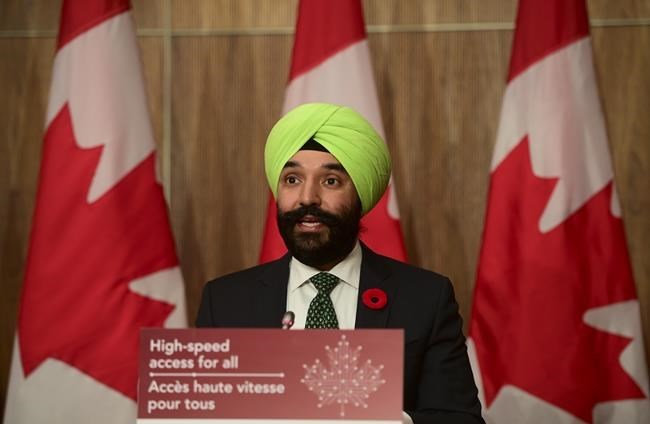OTTAWA — Innovation Minister Navdeep Bains says a federal loan program little-loved by industry will be among the options Ottawa weighs as it sits down with airline executives to negotiate a government aid package.
The Large Employer Emergency Financing Facility (LEEFF) could play a key role in lifting carriers out of the dire financial straits caused by the COVID-19 pandemic, Bains said at a news conference Monday.
The program offers loans of $60 million or more to large companies facing cash problems, but comes with an interest rate that jumps to eight per cent from five per cent after the first year — far above typical private-sector lending rates.
Only two firms have been approved for LEEFF loans since the Liberals announced the program on May 11, according to the Canada Enterprise Emergency Funding Corporation: a casino company and a producer of metallurgical coal.
Groups ranging from the federal Conservatives to Unifor, a union representing 15,000 aviation workers, have criticized the program due to its operating restrictions and high interest rate.
On Sunday, Transport Minister Marc Garneau said federal aid to airlines will hinge on their refunding passengers for cancelled flights — a long-standing demand by opposition parties, passenger advocates and thousands of complaints to the Canadian Transportation Agency.
Talks with airline representatives are set to begin this week, Garneau said.
The industry has called for financial support since the spring while brushing off certain options, such as the government buying stakes in carriers.
Private loans backstopped by the government rather than direct loans or an equity stake would be ideal for sector recovery, said Robert Kokonis, president of Toronto-based consulting firm AirTrav Inc.
"We’re prepared to service that debt. We just want to have a rate of interest that’s much more attractive than the LEEFF program," he said.
However, passenger-rights advocate Gabor Lukacs said purchasing a slice of carriers like Air Canada is Ottawa's fairest way forward, as it would give government a seat at the board tables.
“There’s always the concern about the company’s ability to repay the loan, whether it’s secured properly, whether it would be forgiven in some way," Lukacs said.
Grants should be out of the question, he added. "The idea of privatizing profits while socializing losses should raise concerns from people on both sides of the political map."
Governments around the globe have doled out $123 billion to assist the airline industry, according to Unifor president Jerry Dias, who has said the LEEFF program “just isn’t working” due to “incredible restrictions.”
Canada, on the other hand, has steered clear of sector-specific support — the only G7 country to do so — instead rolling out financial aid such as wage subsidies available to many industries.
Until Sunday, Ottawa had also held off on demanding airlines refund customers whose flights were cancelled due to the pandemic, potentially saving carriers hundreds of millions of dollars.
In contrast, European and U.S. authorities have ordered airlines to offer reimbursement, in addition to the strings attached to financial lifelines that range from limiting dividends and executive bonuses to cutting carbon emissions.
In Germany, authorities opted for a $14-billion bailout of Lufthansa that saw the government take a 20 per cent share of the airline.
A couple billion in potential refunds remain in airline coffers.
Air Canada reported on Monday it held onto $2.3 billion in advance ticket sales last quarter.
The Montreal-based company also burned through $9 million in cash per day, for a loss of $685 million as travel demand remained in the doldrums.
WestJet Airlines, unlike its domestic competitors, announced last month it would repay passengers whose flights it cancelled due to the pandemic. The process will likely take six to nine months, it said.
"That's ludicrous," said Bob Scott, who launched one of several refund-related petitions that have garnered more than 109,000 signatures in total.
Scott took heart in the Liberals' conditional reimbursement pledge, but worries airlines may follow the lead of their European counterparts and persist in their efforts to persuade customers to settle for travel vouchers instead of refunds.
Mike McNaney, head of the National Airlines Council of Canada, which represents Air Canada, WestJet, Air Transat and Jazz Aviation, said he is "encouraged" by the prospect of aid, "but we would like action far more rapidly than things have occurred."
“People are still struggling and people are hoping the government will come through," said his counterpart John McKenna, CEO of the Air Transport Association of Canada, which represents some 30 regional carriers.
"But any time the government tries to please everybody, it ends up pleasing nobody."
This report by The Canadian Press was first published Nov. 9, 2020.
Christopher Reynolds, The Canadian Press




